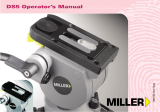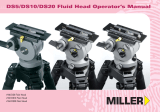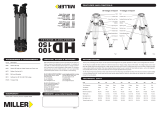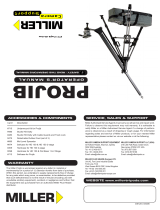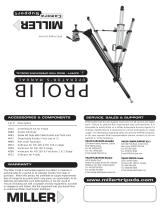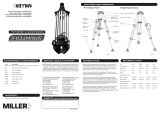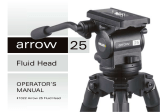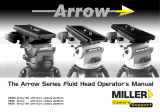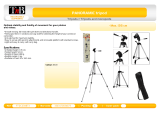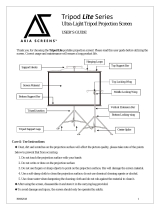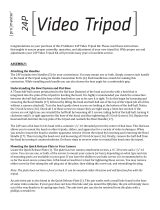Page is loading ...

SOLO TRIPOD SERIES Operator’s Manual
#1630 Solo DV
75mm 2-Stage Alloy Tripod
#1501 Solo DV
75mm 2-Stage Carbon Fibre Tripod
#1505 Solo ENG
100mm 3-Stage Tripod

Features and Controls
75mm Bowl (#1501 & #1630)
100mm Bowl (#1505)
Leg Angle Adjuster
Leg Mounting Bolt
Shoulder Strap Mounting Point
Protective Leg Cover
Leg Lock Direction Label (also leg strap mounting point)
Upper Concentric Lock
Middle Concentric Lock (#1505 only)
Lower Concentric Lock
Screw Down Rubber Foot
Steel Spike
2
#1630 SOLO DV
75mm 2-stage
Alloy Tripod
#1501 SOLO DV
75mm 2-stage
Carbon Fibre Tripod
#1505 SOLO ENG
100mm 3-stage Tripod

Introduction
Thank you for purchasing the Miller SOLO tripod.
SOLO is a professional tripod, compatible with most 75/100mm ball
levelling pan & tilt heads. SOLO is designed to support lightweight
MiniDV and DVCAM camcorders in location and studio production.
The telescopic carbon fibre tubing ensures optimum rigidity and rapid
deployment, while the leg angle lock eliminates the need for a tripod
spreader. As a result, SOLO ENG features an operating height range
from a low 22cm (8.7”) up to an impressive 187cm (73”), with maximum
support stability maintained across the operating range.
Magnesium leg top and aluminium diecast components deliver the
ultimate in lightweight durability while the padded carry bag, detachable
leg strap and rubber/spike complete a truly professional support package.
Operation Manual
Please read this manual carefully prior to
using the SOLO tripod. Do not omit any
steps.
The manual contains important set-up,
pull-down, adjustment, safety and
maintenance information and should be
read in conjunction with the operating
manuals of the fluid head and camera you have
chosen to complement your SOLO tripod.
Technical Data
Cat# 1630 SOLO DV 1501 SOLO DV 1505 SOLO ENG
Bowl Diameter 75mm 75mm 100mm
Tube Configuration 2 Stage telescopic 2 Stage telescopic 3 Stage telescopic
Tube Material Alloy Carbon fibre Carbon fibre
Maximum Load kg (lb) 20 (44.1) 20(44.1) 30(66)
Weight kg (lb) 2.9 (6.4) ( including shoulder strap) 2.5 (5.5) (including shoulder strap) 3.1 (6.8) (including shoulder strap)
Max Height mm (in) 1625 (64) 1614 (63.5) 1870 (73.6)
Min Height mm (in) 234 (9.2) 234 (9.2) 220 (8.7)
Transport Length mm (in) 700 (27.6) 694 (27.3) 658 (25.9)
3

Remove tripod from carry bag, undo clip on leg strap and
stand on a level surface (if possible). Depending on
surface, screw out rubber foot for non-scratch contact
to interior or hard surfaces or screw in for a spike on
exterior soft surfaces such as dirt or sand.
Note: Leg angle adjusters are spring loaded and self
adjusting. Do not hold leg angle adjuster up while spreading
tripod legs as this may cause leg angle adjusters to operate
improperly and potentially damage the tripod.
Maximum Height
(Leg angle adjustment is not required)
1 Separate legs slightly so they are
parallel.
2 Working with each leg
individually, grip concentric locks
and release one turn (see leg
lock direction label on leg).
3 Extend to desired length and
turn each concentric lock to
engage firmly. Repeat process
for remaining legs.
4 Spread tripod legs (Fig. 2)
and adjust leg length to
ensure tripod bowl is
approximately level.
5 Level the fluid head using bubble level and ball
levelling feature of fluid head.
Minimum Height
Note: It is recommended that
minimum height position is used only
with legs at their shortest length.
1 Pull up leg angle adjuster until it locks into a raised
position (Fig. 3). Repeat for all three locks.
2 Holding one leg on the ground pull the remaining two
outward, spreading the tripod to its lowest position. Leg
angle adjuster will automatically engage the leg to hold
the tripod at its lowest
height position (Fig. 4).
Tripod Setup
Fig 1 Collapsed
position
Fig 3 Leg angle adjuster
raised
Fig 4 Lowest height
position
Fig 2 Spread
position
4

Mid Position
Note: This refers to the mid leg
angle position, not necessarily the
height of the tripod.
The SOLO tripod has three leg angle
positions. The middle leg angle position
(Fig.7) is self-engaging after closing leg
from fully spread position (Fig.6). The
mid position is chosen for optimum
stability in the 50-130cm tripod height
range, but is not recommended if the
tripod is being used in a crowded
situation, due to the wide
diameter, or footprint
spread, of the extended
tripod.
1 Remove camera from fluid head.
2 Close the tripod legs so all are pointing
straight down and disengage all
concentric locks.
3 Holding the bowl, lower tripod to its
shortest length and re-engage
concentric locks.
4 Close legs together fully (Fig. 1) fit leg strap and return tripod to
carry bag if finished shooting.
5
Fig 6 Spread Position
Tripod Setup (cont) Tripod Pull Down
Fig 5 Leg angle adjuster
raised
Fig 7 Middle leg
angle position

Shoulder Strap
SOLO’s Shoulder Carry Strap can
be used looped (both ends
attached to the mounting point on
the bowl), to carry the tripod on
one shoulder,
OR
it can be used attached to the
bowl and the Leg Strap “D” ring,
to carry the tripod across your
back with fluid head towards the
ground.
Leg Pivot Adjustment
The leg to bowl pivot joint on the SOLO tripod should have no lateral
movement and should swing with a firm, smooth resistance. As this is
a spreader-less tripod, the leg pivot joint requires sufficient resistance
to hold the tripod legs together while being hand carried. Adjustment
is usually not required, however, should it become necessary, the
following procedure must be observed.
1 Lay tripod on a flat surface with legs closed in
transport position.
2 Using 17mm spanner (supplied), gently
tighten nut to achieve firm, smooth movement of
the leg while still having sufficient tension to hold
the legs together when tripod is being hand
carried.
3 Check leg resistance by swinging leg fully open
(using leg angle adjuster) and ensure that all legs
open with a similar degree of effort. Tighten or
loosen bolts as necessary.
Important: Remember not to over-
tighten as this may cause too much
resistance when swinging the legs open.
6

7
Leg Strap
The Leg Strap is attached to largest diameter leg
tube (as delivered from factory) using ‘hook
and loop’ tape.
The Leg strap also has a “D”
ring attachment point for
the shoulder strap if
required. Check the Leg
Strap periodically to ensure
hook and loop tape is secure.
Maintenance
Regularly inspect tripod for damage or grit. Pay particular
attention to carbon fibre tubes, concentric locks, leg angle
adjusters, condition of bowl, feet and general operation of the
tripod.
Keep grit and dirt out of leg angle adjusters. If leg angle adjusters
or legs grind or stick during operation they may have grit in
contact with their sliding surfaces. The affected parts will require
disassembly and cleaning. Failure to do so may result in
excessive wear and breakage of tripod components.
Regularly clean tripod with a damp rag or soft brush. Wipe off all
sand, dust and salt spray. Do not clean with solvents, cleaning
fluids, lubricants, polishes, abrasives or wire brushes.
Transport and store tripod in Miller bag or case wherever
possible. Store tripod in a dry place, away from direct sunlight.
Safety
Read the Operator’s
Manual
Miller recommends that all camera
support equipment should be carried in a
carry bag to reduce the risk of accidental
damage during transport. All Miller SOLO
systems include a carry bag to protect the
tripod and reduce exposure to dust and moisture
during transport and storage.
Ensure that the weight of the camera/lens/battery payload
mounted on your tripod does not exceed the recommended
capacity of the fluid head. This will ensure that the tripod and
fluid head you have chosen will operate to their specification.
Note that any offset payload, such as a telephoto lens, will exert a
forward offset load on the support system. Refer to your fluid
head users guide to ensure these loads are properly balanced.
Never set up or pull down a tripod while a camera is mounted on it.
The camera base should be fastened to a suitable camera plate
and tripod plate prior to mounting. The camera should be
attached to the fluid head only after all tripod leg locks are
positively engaged (in locked position) and the tripod is on a
stable surface.
The safe operation of the tripod is the responsibility
of the operator.

D6010-3 07/06
SOLO System Configurations
Cat # 75mm Systems
#1637 SOLO 5 Alloy: SOLO DV 75mm Alloy Tripod (1630) with DS5
Fluid Head, Softcase (1518)
#1640 SOLO 10 Alloy: SOLO DV 75mm Alloy Tripod (1630) with DS10
Fluid Head, Softcase (1518)
#1511 SOLO 10 Carbon Fibre: SOLO DV 75mm Carbon Fibre Tripod (1501)
with DS10 Fluid Head, Softcase (1518), Shoulder Strap (1520)
#1643 SOLO 20 Alloy: SOLO DV 75mm Alloy Tripod (1630) with DS20
Fluid Head, Softcase (1518)
#1514 SOLO 20 Carbon Fibre: SOLO DV 75mm Carbon Fibre Tripod (1501)
with DS20 Fluid Head, Softcase (1518), Shoulder Strap (1520)
Cat # 100mm Systems
#1793 SOLO Arrow 25: SOLO ENG Tripod (1505) Arrow 25 Fluid Head
(1022) Pan Handle (689) Shoulder Strap (1520) Softcase (872)
#1709 SOLO Arrow 40: SOLO ENG Tripod (1505) Arrow 40 Fluid Head
(1025) Pan Handle (692) Shoulder Strap (1520) Softcase (872)
Optional
Cat# Description
#394 Solo Dolly #1590 Solo Leg Covers (3)
#1520 Shoulder Strap #1518 Carry Bag
#872 Softcase (padded) #1521 Transport Strap
#P6005
17mm Spanner
Warranty Please refer to warranty card for complete details
Website
www.millertripods.com
Service and Sales Support
Miller Authorised Service Agents must carry out all service and repair
work on SOLO tripods. Failure to observe this requirement may void
warranty. It is advisable to notify Miller or a Miller Authorised Service
Agent if a change of performance is observed as a result of impact or
rough usage. For information regarding sales and service of Miller
products, or for your nearest Miller representative, please contact us via
our website or at the following:
MILLER CAMERA SUPPORT (Australia)
30 Hotham Parade, Artarmon, Sydney
NSW 2064 Australia
Tel: +61 2 9439 6377
Fax: +61 2 9438 2819
Email: sales@miller.com.au
MILLER FLUID HEADS (Europe) LTD.
Unit A2, Ford Lane Industrial Estate
Ford Lane, Ford, West Sussex
BN18 0DF United Kingdom
Tel: +44 (0)1243 555255
Fax: +44(0)1243 555001
Email: [email protected]
MILLER CAMERA SUPPORT LLC (USA)
216 Little Falls Road, Cedar Grove
New Jersey 07009-1231 USA
Tel: (973) 857 8300
Fax: (973) 857 8188
Email: [email protected]
MILLER TRIPODS Canada
1055 Granville Street
Vancouver BC V6Z1L4, Canada
Tel: (604) 685 4654
Fax: (604) 685 5648
Email: [email protected]
/

